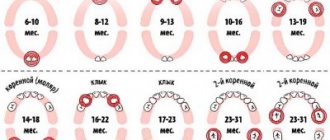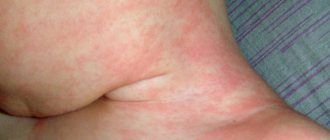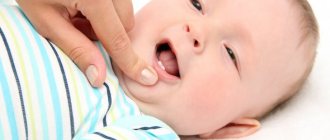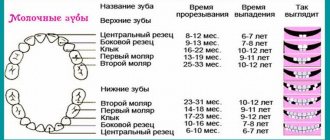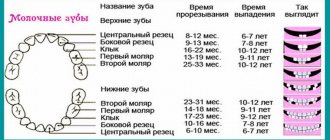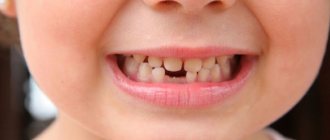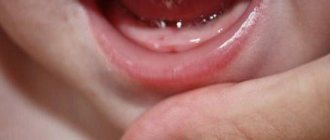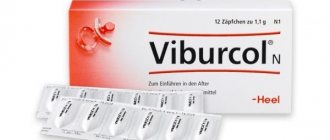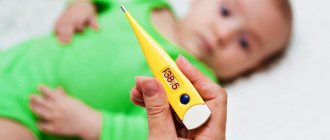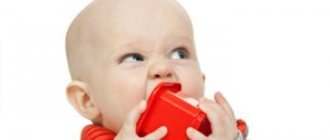Can children have a teething cough?
A child may cough while his teeth begin to grow, due to increased blood circulation in the gum area and the close proximity of the nasal cavity. Due to the inflammatory process, a runny nose appears.
Constant discomfort torments the baby, which is why he cries. This leads to an accumulation of mucus. It flows into the nasopharynx, irritates the respiratory tract, and leads to coughing attacks.
When teeth are cut, gums are injured, and profuse salivation begins. This is how the body responds to damage to the oral mucosa. Saliva also flows down the throat, causing spasms.
When teeth erupt, the immune system is greatly weakened, as a result of which the body becomes vulnerable to various diseases. Infants have a severe cough for the following reasons:
- constantly stuffy nose;
- the child has been sick for a long time;
- there is a hidden viral disease.
Parents are also concerned about the cough that occurs during teething. More often it is wet and is associated with increased salivation. It goes away without treatment after a couple of days. You can determine the natural discharge of mucus by the skin around the lips - it is irritated.
If you are teething, you may also experience a dry cough. It appears when sputum has not had time to accumulate in the lungs, and also due to the drying out of the nasopharynx due to the constant crying of the child at the initial stage of teething.
Why does my baby have a cough?
The most common causes of cough in a small child during teething are the following factors:
- increased salivation,
- a cold resulting from a decrease in immune defense,
- development of respiratory disease,
- irritation of the back wall of the nasopharynx, which provokes a reflex reaction (if the baby also has sleep).
Swelling during teething brings discomfort and causes coughing in the child
An additional symptom is often redness of the skin on the cheeks and chin. As the first teeth grow, the gums noticeably swell and redden, which is explained by the rush of blood to the tissues. But certain changes also occur in the baby’s nose – there is active production of mucus, which causes reflex coughing.
Is it necessary to treat a cough on teeth?
Teething and coughing often accompany each other. This period proceeds with strong whims of the child. Children refuse to eat and cry constantly. Coughing from teeth is preceded by swelling of the gums and clenching of the jaw.
It is important to distinguish teething from a cold, since this symptom does not need to be treated. Any medications can harm a child’s body.
If you notice a wet cough due to teeth, it is recommended to monitor the child’s well-being and wait for the attacks to go away on their own. When a wet cough plagues a baby for more than 5 days, you should consult a doctor.
When should you not worry?
When teething, a child may experience a whole range of symptoms. But they are not clearly expressed.
- The temperature is usually no higher than 37.5° - 37.7° degrees. At the same time, the child’s well-being does not suffer. He is cheerful and active.
- The throat is the usual pink color. The doctor does not see any inflammation.
- A runny nose is also short-lived. The mucus is transparent, without impurities. It usually goes away within a week
- Cough. Rare during teething. Disappears along with increased salivation. Usually in two to three days.
Remember. If the cough is frequent and the child cannot clear his throat, call a doctor. Children develop complications very quickly. Therefore, if you do not want to end up in the hospital with some kind of bronchitis - at the first suspicion - do not hesitate to consult a doctor.
When you urgently need a doctor and immediate help at home
Coughing during teething is almost always accompanied by copious amounts of saliva and snot. If the nasal secretion changes consistency, color, turns yellow or green, or congestion appears, you should contact your pediatrician. The following symptoms are also a reason to consult a doctor:
- A dry cough accompanied by convulsive attacks and lasting more than 6 minutes may indicate whooping cough.
- A sharp attack of barking cough during sleep often indicates laryngitis.
- Difficulty breathing with shortness of breath and wheezing in the chest is a sign of pneumonia.
- High body temperature (more than 38°C) is a sign of acute respiratory viral infection, influenza or other diseases.
- Redness of the throat, the appearance of a white coating or ulcers are often a symptom of a sore throat.
If such signs intensify and the child’s condition worsens, it is necessary to urgently call an ambulance.
What symptoms accompany the teething period?
Sometimes it is difficult for a mother to understand which signs of teething are normal for the baby and which are not. Each baby reacts differently to the growth of baby teeth. Some will develop a high fever and runny nose, swelling of the gums, while others will endure this period painlessly.
Normally, teething begins at 4-8 months. The age at which primary teeth appear depends on many reasons, including heredity, nutritional habits and systemic diseases. By middle school, the baby set of teeth will be replaced by permanent ones, which will remain with the person for the rest of his life.
The eruption of the first teeth is often accompanied by unpleasant symptoms:
- swelling, swelling of the gums;
- the appearance of white bubbles or small blue hematomas on the gums;
- increased salivation;
- desire to chew, scratch gums;
- severe pain, as a result of which the baby cries, screams, and often wakes up at night;
- coughing caused by excessive salivation;
- runny nose with clear discharge without foreign impurities;
- an increase in body temperature to 38°C for 2-3 days;
- anxiety, irritability;
- the baby is fiddling with his ears - the pain from the tooth can radiate into them;
- appetite and sleep disorders;
- red rash around the mouth due to skin irritation from saliva;
- the baby sniffles in his sleep;
- occasional cases of diarrhea.
We invite you to read why the palate in the mouth is ribbed: the main reason
Based on these signs, we can conclude that the child’s first tooth will soon come out.
How to help your child with a cough
When a baby's teeth are teething and this is accompanied by a cough, traditional methods will help. Strong medications cannot be given without signs of illness. Expectorant medications are also ineffective, since a baby under one year old cannot yet cough up sputum.
It is necessary to carefully monitor the child’s condition, give more breastfeeding (if he is breastfed), and put him to bed more often. If he wakes up coughing, you can raise his head a little to solve the problem.
Traditional methods
If a child under one year of age has a cough, any alternative means should be used with great caution, as they can cause allergies. It is advisable to consult a doctor.
It is good to give your child herbal infusions or children's teas (with chamomile, raspberries, rose hips), but not more than 1 tbsp. three times a day.
If the baby is not allergic to honey, you can lubricate the gums with it. It has an anti-inflammatory and disinfecting effect.
Compresses help with coughs. They should not be done at elevated body temperatures. Here are some effective formulations:
- Flour, sunflower oil, mustard powder, and vodka are mixed in equal proportions. The mixture is divided into 2 parts, each of which is laid out on different towels. Compresses are placed on the chest and back and secured. The child is dressed in warm clothes. The compress is removed after 2 hours.
- Take warm boiled potatoes, put them in a bag, wrap them in a towel, apply them to the chest area, and leave for 60 minutes.
Massaging the child’s back can also help relieve an attack. It must be done carefully, with smooth movements in the direction from the lower back to the neck, bypassing the spine area.
Medicines
All parents who are faced with a cough in a child at the time of teeth growth are interested in how to treat it and what is suitable from pharmaceutical products. Since attacks appear as a result of large drooling and runny nose, all treatment should be aimed at regularly moisturizing the nasal mucosa and eliminating mucus.
You can moisten your baby’s nose with a regular saline solution or pharmaceutical drops with sea water (Aqualor Baby, Aquamaris, Salin). They relieve irritation and swelling, wash away snot.
Rinse the nose as follows:
- The child is placed reclining.
- The head is turned to the side, 3-5 drops of solution are dripped into each nostril.
- Take a bulb or a special nasal aspirator, insert it into the nasal passage, close the second nostril with your finger, and suck out the snot.
- The same manipulation is carried out with the other nostril.
To make your gums hurt less, you can use special ointments (Kamistad, Kalgel, Pansoral). Sometimes Dentokid tablets are prescribed, which need to be dissolved in water. They relieve pain well, have an antiseptic effect, and prevent increased salivation during tooth growth. Apply up to 4 times a day.
Other ways to relieve the condition
A baby's cough, which is caused by tooth growth, does not require therapy. The main thing is to monitor how the child feels. To make your gums hurt less, you can massage them lightly and let your baby chew a chilled teether. It is also important to follow some preventive measures:
- Ventilate the room more often.
- Give your child more water, which prevents the mucous membrane from drying out.
- Don't force your child to eat if he doesn't want to.
- Place a small pillow under the head to prevent mucus from draining into the nasopharynx.
- Don't give up breastfeeding. It is better to wait for the teeth to grow, and only then curtail lactation.
- Do not wrap the child so that the body temperature does not increase.
- Walk outdoors more often.
A good purchase is a humidifier that maintains optimal indoor air humidity (40-65%). Thanks to it, breathing is normalized, the outflow of snot and sputum is improved, and the child’s body independently fights bacteria and viruses.
How to alleviate the child's condition?
A runny nose, which occurs during teething, requires only symptomatic treatment.
- You can periodically give your baby a pre-chilled teether. This is a special device, which is made from materials of different hardness and is designed to facilitate the teething process.
- If the baby’s body temperature rises during teething periods, it is necessary to use antipyretic drugs. Optimally - based on paracetamol (for infants, one of the options may be rectal antipyretic suppositories).
- Before going to bed, in case of severe coughing attacks, children need to instill bactericidal nasal drops, herbal decoctions or saline solutions (aquamaris, salin).
- As a preventive measure, it is necessary to give the child immunostimulants to increase the body's defense reactions.
- The child's room should be maintained at an optimal temperature (18-20 degrees) and humidity at 60%.
- Older children should be given plenty of warm drinks: natural juices, fruit drinks, compotes, herbal and regular teas, milk, alkaline mineral water without gases.
- For infants, it is necessary to provide sleeping conditions such that the head is slightly elevated relative to the body. This will facilitate the flow of mucus along the back wall of the larynx, preventing it from accumulating and causing irritation of the mucous membranes.
- If possible, the baby should be turned from one side to the other during night sleep.
Questions that concern parents
Some parents experience a longer cough in their baby. At the same time, there are no other signs of the disease: the lungs are clean, the throat is not red, there is no temperature. Pediatricians call this severe teething syndrome. In this case, coughing attacks either arise or go away on their own.
This can last until all the teeth come out. It is important to consult your pediatrician regularly so as not to miss the negative effects.
During the teething process, complications sometimes occur, which are accompanied by cough, high fever, and inflammation of the lymph nodes. This can happen if the gum does not rupture, but remains above the tooth, as a result of which blood stops flowing to it and necrosis forms. If, in addition to coughing, parents observe similar symptoms, they should immediately consult a doctor.
When a baby develops a cough without other visible symptoms, doctors often associate this symptom with teeth. However, it can be caused by allergies.
Allergens include dust, animal hair/saliva, washing powder or cosmetics, flowering indoor plants, improperly selected mixture or food.
In this case, the cough is accompanied by swelling in the nose, severe runny nose, skin rash, and increased lacrimation. To eliminate such symptoms, antihistamines are prescribed, for example, Fenistil, Zyrtec, Suprastin.
Tips for parents
First of all, you need to make sure that the accumulated sputum does not dry out. This requires regular ventilation and air humidification. All this will speed up the healing process.
- Provide the child with plenty of fluids.
- When the baby is sleeping, the best option for him is the side.
- After an infection, before teething, you should ask your pediatrician for recommendations on taking immunostimulating medications to strengthen the body.
- If a fever appears in the teeth, it is an infection.
- Do not self-medicate, but strictly follow the advice of your pediatrician.
- If a child is under 3 years old, expectorants should not be given because they do not yet know how to spit out mucus.
- If the cough is associated with teething, the doctor usually does not prescribe medications at all.
The main thing is not to interfere with the teething process. Science cannot influence the appearance of teeth in any way. For each child this is an individual period and what is characteristic of one is not characteristic of another.
Also, the child takes an individual approach to overcoming problems associated with the appearance of teeth. But if he can’t cope, then only proven methods are needed. Don't expect bad consequences.
(25.00 out of 5)Loading…
All the “delights” of teething: cough, runny nose, drooling...
07.10.2018
When a child is healthy and cheerful, it makes parents very happy. But when the baby begins to have health problems, mothers and fathers are very worried and diligently search for the cause of the runny nose, cough, and fever.
Many attribute all problems to teething, and it doesn’t matter how old the child is - 2 months or 2 years. A teething cough is quite common, but sometimes it may not be related to dental problems.
When and why does teething cough appear? What other symptoms might there be? What to do and how to help the child? Read a detailed description of the problem and a guide to action in today's material.
Teething symptoms
Teething is a big challenge for a baby
Children cannot always tell when something is bothering them. How can parents know that their child is about to cut a tooth? Let's figure it out. All of the symptoms described below, both together and separately, may indicate imminent teething:
- the child puts everything into his mouth: the baby tries to bite everything that comes into his field of vision - mom, dad, door, cat,
- salivation increases,
- behavior changes: the baby is capricious and wakes up more often at night,
- gums may become swollen and red,
- poor appetite or refusal to eat,
- the temperature rises: it all depends on age. In infants it can jump to 39 ⁰С, in older children up to 37.5-38 ⁰С. But here everything is individual - there may be no temperature at all,
- a runny nose and/or cough appears,
- bad breath: new elements can injure the mucous membranes on which inflammation appears,
- indigestion: constipation or diarrhea.
It is important to know! Symptoms such as cough, runny nose, lethargy, fever, and problems with bowel movements can be a sign of a serious illness - this is especially dangerous for infants. Babies become dehydrated and overheat very quickly, which means their internal organs suffer. Therefore, there can be no talk of self-medication here. You should definitely contact your pediatrician.
Causes of cough during teething
Could a cough be the cause of a child's growing teeth? Why does a cough reflex appear during teething? Here you need to understand that coughing itself cannot be caused by teething. It occurs as a concomitant symptom. Why is this happening? Main causes of cough:
- from saliva: when a tooth begins to grow, the blood supply to the gums increases and salivation increases. The child may not have time to swallow saliva, and in order not to choke on it, he will cough,
- runny nose: the mucous membranes of the oral cavity are very closely connected with the nasopharynx - accordingly, blood circulation in the nose increases. Because of this, the nasal mucosa produces more secretory fluid (or, as people say, “snot”). If the child does not know how to blow his nose, then the snot will flow down the back wall of the throat. Therefore, snot is often accompanied by a cough.
- decreased local immunity: the eruption of the primary dentition is a rather complex and painful process that negatively affects the immune barrier of the oral cavity. Therefore, viruses and bacteria have an excellent opportunity to reproduce. Because of this, various diseases (ARVI) appear that cause coughing.
Why does a cough occur during teething?
“I never understood some mothers who claim that the cough appears precisely because of the teeth. Several pediatricians told us that when teeth are cut, immunity drops, so the child catches colds more easily and picks up all sorts of bad viruses - hence the cough with snot, or even worse. That is, you need to strengthen your immune system and not go to places where you can catch the infection.”
Alexandra A., 25 years old, Astrakhan, review from the women’s forum baby.ru
The order of appearance of teeth
When does which tooth appear? In the daily hassle, parents may forget that the child’s first tooth may soon erupt. And you need to prepare for this process (we will return to this in more detail later). Let's look at the cutting order:
- central lower incisors: 6-10 months,
- central upper incisors: 8-12 months,
- second incisors from below: 10-16 months,
- second incisors from above: 9-13 months,
- canines: 16-24 months,
- first molars (chewing): 13-18 months,
- second molars: 25-33 months.
Normally, the first primary tooth (lower central incisor) erupts by 6-7 months, and complete eruption of all 20 elements of the primary occlusion should occur by 3 years. But here everything is very individual. Pediatricians note that the process of teething can begin earlier than six months, and later than 12 months. It all depends on hereditary factors and concomitant diseases.
Scheme of eruption of baby teeth in a child
It is worth noting that the change of bite from milk to permanent begins at approximately 6-7 years.
The incisors are the first to change, the molars gradually appear, and permanent premolars grow instead of primary molars.
The shift ends by the age of 13-14 and usually passes without pronounced symptoms - after all, by the age of 7 the child already has a fairly strong immune system.
“My youngest and I rushed to the hospital. The child is 3 months old, temperature is 39 ⁰C, does not want to eat or drink. We lay there for two days, and then during the rounds the doctor said - your 2 lower incisors are coming out. By that time everything was fine with the child.
We decided to refuse hospitalization and went home. And what do you think? Next week, with the same symptoms, we return to the same hospital, to the same ward! And a day later, my son’s 2 upper incisors erupt.
I didn’t know that this could happen - with older children, everyone missed their deadlines, but this one is kind of reactive.”
Elena T., 30 years old, Samara, review from woman.ru
What could a cough be like?
It is important to determine the type of cough
Can there be a strong cough during teething? How long does the cough last? Let's figure it out. Cough during teething can be of two types: wet (wet, productive) or dry (non-productive).
Its duration depends on what caused it. If it appears due to drooling or snot, it will quickly disappear after eruption - literally in 3-4 days.
How often does your child cough? Here you need to understand that if you remove snot in time (with a nasal aspirator, for example) and wipe away saliva (and also regularly give your child water to drink so that he normally swallows viscous saliva), then the baby will cough less often. And if these conditions are not observed, then the child will cough often - for 5-10-15 minutes without a break.
When you urgently need a doctor and emergency help at home
If the child's condition worsens, you should call a doctor.
It is clear that if the child’s general condition is normal, he behaves adequately, the cough is wet, and the mucus from the nose is clear, then there is no need to worry too much. You can safely contact your pediatrician in the morning.
After all, an examination by a doctor is necessary in any case. But if the baby has a high temperature, vomiting, diarrhea, lethargy, convulsions, wheezing and a barking paroxysmal cough - this is already a sign of very serious problems. Here you need to urgently call “112” “03” (from cell phones “030”).
The emergency medical technician will provide further advice.
What to do if you have a strong dry barking cough before the doctors arrive? If there is no allergy to drugs, put vasoconstrictor drops into the nose and give a decongestant drug (Suprastin or Cetirizine). Give the child inhalation with saline solution.
The room should be cool. Therefore, it is worth turning on the air conditioner or opening a window. If you don’t have an inhaler, take your child and turn on the water in the bathroom so that the air is humidified as much as possible.
And try to do all this as calmly as possible - after all, a state of panic can be passed on to the baby.
How to relieve your baby's condition
Many parents have noticed that coughing occurs during sleep. Therefore, during daytime and nighttime sleep, it is recommended to raise the baby’s head by 15⁰. You can place a voluminous pillow under your head and shoulders, or place it under the mattress in the crib to create an optimal tilt. This is necessary for normal mucus outflow and easier nasal breathing.
Teethers help the child well during teeth growth
Purchase in advance products that relieve pain during teething - Kamistad or Kalgel gels. Special silicone teethers that the child can chew on and scratch his gums on will come in handy.
You should also have a supply of pacifiers at home. If suddenly the baby accidentally gnaws through his favorite pacifier, and there is no replacement for it, then the parents will have an extremely “fun” night. Orthodontic pacifiers would be preferable - they will protect the child from malocclusion problems in the future.
Cough syrup will help your baby's condition
If a child has a cough, a runny nose and a fever when teething, then you need to know how to treat it. Of course, only a pediatrician can prescribe therapy - if it is necessary. But while waiting for a doctor, at a temperature above 38.5 ⁰C, you can give your baby Nurofen or Paracetamol syrup.
Living conditions are also important - the temperature in the room should be between 18-21 ⁰C, air humidity 40-70%, the room should be regularly ventilated and dust should be wiped off daily.
Dust mites will still remain on thin pages.
Source: https://anZub.ru/detskaya-stomatologiya/kashel-pri-prorezyvanii-zubov/
When should you see a doctor?
A runny nose during teething is usually mild - the child’s snot is clear, and the duration of the illness is limited to several days. However, in some cases, in order not to aggravate the problem, it is necessary to consult a doctor. Let's look at what symptoms should alert parents and when to see a specialist:
- rhinitis lasts longer than a week;
- body temperature exceeds 38 degrees;
- the child is lethargic or very agitated and has poor appetite;
- snot has a thick consistency and has a yellow-green tint;
- blood streaks are noticeable in the nasal discharge;
- severe cough, hoarse voice;
- the baby cries if his mother touches his ear;
- pus is discharged from the child’s ears;
- the baby does not get better after 3-4 days.


